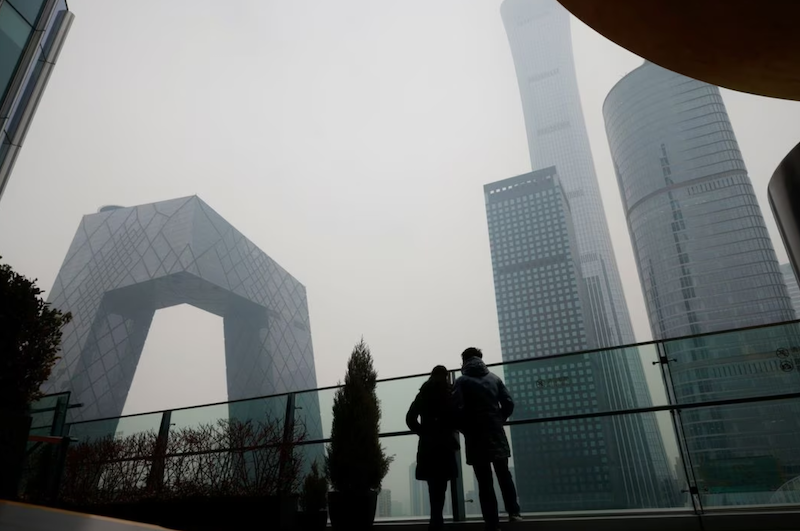China’s provincial governments have sold large amounts of special bonds this year to revitalise struggling smaller banks.
These moves have sought to reduce risks of spillover from the severe property crisis and economic slowdown.
Special-purpose bonds are a form of off-budget debt financing used by local governments in China, with the proceeds raised typically earmarked for specific policy goals, such as spending on infrastructure projects.
Local governments plan to use the proceeds of the latest bond sales to purchase equity or convertible bonds from smaller banks that are mostly state-owned to effectively recapitalise them, according to deal prospectuses.
ALSO SEE: COP28: Cities Give A Glimpse of Changes Sweeping the World
The governments have raised 152.3 billion yuan ($21.05 billion) via such bonds so far in 2023 to replenish the capital of small and medium-sized banks, according to data from the official China Electronic Local Government Bond Market Access.
But total funds raised so far are modest compared to the banks’ needs, analysts say.
China’s small, regional banks would need to address a capital shortfall of an estimated 2.2 trillion yuan based on a scenario where up to 20% of regional lenders face capital inadequacy, according to a report by S&P Global Ratings in October.
Small banks being propped up
Highlighting Beijing’s push to avoid a financial crisis like the one in 2008, the value of special-purpose bonds issued this year is already more than double the 63 billion yuan issued in 2022, and is the highest on record since such instruments were introduced in 2020 to help smaller lenders impacted by the Covid-19 pandemic.
The trend highlights how more and more of the country’s smaller banks are being propped up with government support, amid a deepening crisis in the property market, which accounts for about a quarter of the economy.
Authorities have been ramping up measures to support real estate, including relaxing home purchase restrictions and lowering borrowing costs, although these have failed to shore up a meaningful recovery.
The People’s Bank of China (PBOC) and the National Financial Regulatory Administration (NFRA) did not respond to a request for comment.
Concern over local government debt
The intensified efforts to support smaller banks also come amid growing worries about the impact of ballooning local government debt on the economy.
Local government debt reached 92 trillion yuan ($12.6 trillion), or 76% of China’s economic output in 2022, up from 62% in 2019, according to the latest data from the International Monetary Fund.
While policymakers are highly concerned over rising debt levels, Beijing has little option but to support smaller banks to contain spillover risks, analysts said.
“It is important to avoid any failures of even the smallest institutions, as a single failure could generate knock-on effects and spread financial contagion to other financial institutions,” Gavekal Dragonomics researcher Zhang Xiaoxi said.
It was not immediately clear if the central authorities had given any guidance to the local governments on recapitalising smaller banks, and who were the buyers of these special-purpose bonds.
Some provinces are accelerating plans to reform and defuse risks at local, high-risk small and medium-sized banks and to replenish capital via multiple channels, central bank governor Pan Gongsheng said in Beijing earlier this month.
Risk of contagion
Local governments and banks are fundamental to China’s economy, with Beijing tasking provincial and city officials with meeting ambitious growth targets.
But after years of over-investment in infrastructure, plummeting returns from land sales, and soaring Covid costs, economists say debt-laden municipalities now represent a major risk to the world’s second-largest economy.
The issuance of fresh debt by the local governments to recapitalise banks, coming at a time when their own liabilities are growing rapidly, could make the financial balancing act for municipalities even more precarious.
On top of $21 billion raised so far this year, the Henan provincial government last week announced a plan to issue 28.2 billion yuan worth of special purpose bonds to recapitalise 26 local banks, according to the government website.
Small banks are finance sector’s weak links
Smaller regional banks are the weak links in China’s $61 trillion financial sector, due to their industrial, sectoral and geographical concentration, opaque governance, and lack of stringent regulatory oversight.
As of end-September, China’s rural commercial banks reported a 3.2% non-performing loan ratio with city commercial banks at 1.9%, data from the NFRA showed, higher than the average of 1.6% in the banking sector.
Many analysts believe the real amount of soured loans is far higher.
Smaller Chinese banks face greater challenges in raising funds to replenish their balance sheets compared with their large peers, because of their lower creditworthiness, limited operating scope and risk profiles.
Among the top issuers of the special bonds this year are debt-laden provincial governments in Liaoning, Yunnan and the government in Inner Mongolia region, which aim to use the proceeds to recapitalise local banks.
Regional banks operating primarily in weaker regions heavily exposed to indebted local government financing vehicles bear higher credit risks than their peers in wealthy regions, S&P analysts said in last month’s research note.
“Local governments are a likely the first line of defence whenever regional banks become stressed,” they said. “Nevertheless, we expect local-government support to strained lenders will be selective.”
- Reuters with additional editing by Jim Pollard
ALSO SEE:
China Tells Local Officials to Halt Risky Public-Private Projects
China to Issue More Government Bonds to Tackle Debt Crisis
Small China Banks May Take $300bn Hit From LGFV Debts: S&P
China Facing Reality Check After Long Boom Built on Debt
China’s Property Sector Will Remain Weak For Years: Goldman
























